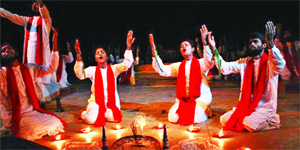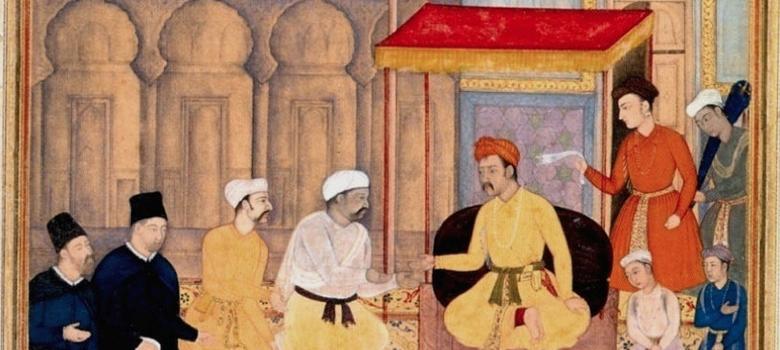Bishad Sindhu’, an adaptation of a novel by Mir Mosharraf Hossain of the same title, was staged at the Studio Theatre Hall of Bangladesh Shilpakala Academy on Saturday evening making the audience gloomy in sorrows and pain.
It was more soul touching at this time when the Muslim men women and children are being killed in Israeli atrocities in Gaza.
The students of Theatre and Performance Studies department of Jatiya Kabi Kazi Nazrul Islam University, Trishal, Mymensingh, staged the play in protest against the aggression in Gaza.
‘Bishad-Sindhu’, which has been directed by Syed Mamun Reza, chairman of Theatre and Performance Studies department of the university, is a play based on the tragic story of Karbala.
The play depicts the story of the Battle of Karbala. The main subject-matter of the novel is comprised of the events responsible for the death of Imam Hossain, the grandson of Prophet Hazrat Muhammad (Sm).
The Battle of Karbala took place on Muharram 10, in the year 61 AH of the Islamic calendar (October 10, 680) in Karbala, situated in present day Iraq. The battle was between a small group of supporters and relatives of Prophet’s grandson Hussein ibn Ali, and a much larger military detachment from the forces of Yazid I, the Umayyad caliph, to whom Hussein had refused to give an oath of allegiance.
Hussein and 20 members of the family of the Holy Prophet(saw) had been killed in the field of Karbala while the women and children taken as prisoners. The dead are regarded as martyrs by both Sunni and Shia Muslims, and the battle has a central place in Shia history and tradition, and has frequently been recounted in Shia Islamic literature.
Mir Mosharraf Hossaain in his novel portrays different characters, pains and anguish of human life, jealousy and hatred of man and, at the same time, provides a historical background for the clash that ensued over a throne, struggles, blood-bath, killings and so on.
‘Bishad-Sindhu’ starts with a prophecy by Hazrat Muhammad (Sm) and concludes with the materialisation of it. Apart from this prediction, it contains some supernatural happenings. For example, the vanishing of the slaughtered head of Imam Hossain before Yazid’s eyes, bleeding of trees on the ground of Karbala, the coming to earth of Hossain’s parents during his last rites and the imprisonment of Imam Hanifa between two hills.
The play articulates the concept that Imam Hasan and Imam Hossain were not made of flesh and blood, because they were completely dependent on the supernatural force and they did not consider themselves responsible for the outcome of their own deeds.
On the other hand, although Yazid, Maimuna and Marwan were cruel, they appeared to be made of blood and flesh, because they thought the future events were influenced by their present actions.
Yazid continued his struggles by entering the conflict with the descendants of Hazrat Muhammad (pbuh); but he always relied on his own prowess and strategies.
But Imam Hasan and Imam Hossain embraced death without any protest or resistance; because they believed that it was the will of God, and consequently they had to accept death.
Most of the incidents in ‘Bishad-Sindhu’ revolve around Zainab. The main reason for the clash between Yazid and Imam Hasan-Hossain was Zainab. Zainab was a chaste wife. After being deserted by her first husband, she entered into matrimony for the second time with Imam Hasan.
Because of an irony of fate, she was imprisoned in Yazid’s jail after the death of Imam Hasan. While in captive, she felt that she was responsible for the blood-bath at Karbala. These incidents would not have happened if she had accepted Yazid as her husband.
The play articulated that the appointment of Yazid as Caliphate was not received joyfully in Medina. Yazid wanted to prevail in Medina but failed due to the mass protest in the city. He found Imam Hasan as an obstacle for him.
Marwan, the governor of Medina, secretly contacted one of Hasan’s wives, Jaeda bint al-Ash’ath ibn Qays, and convinced her to poison her husband. After the death of Hasan, Hossain tried to lead Medina.
Then Marwan suggested him to leave Medina to ensure the safety of the mass people because Yazid will fight against Hossain.
Hossain and his family and followers (consisting of 72 people, including women, children and elderly people) left Medina to go to Kufa, a city of Iraq. But at the battle of Karbala, Hossain and his followers were killed, including Hossain’s six-month-old infant, by the army of Yazid.
The surviving members of Hossain’s family and his followers were taken captive. They were taken to Damascus and jailed there. The production makes a strong voice against all kinds of wars and killings.
The probable cast of the play includes Emran Hasan Shimul, Farzana Tasmim Dia, Jebin Sultana, Muslematul Jannat, Atiqur Rahman Sujan, Uttam Chandra Shil, Wahida Sultana, Bipasha Saha, Al-Amin, Mujahidul Islam, Humayun Kabir, Rais Uddin Ahmed, Ashik Mahmud, Monir, Sena, Nusrat, Saddam, Amol and Arefin, among others.
Earlier on Tuesday evening, students of the Theatre and Performance Studies Department of Jatiya Kabi Kazi Nazrul Islam University (JKKNIU) staged “Bishad Sindhu at its auditorium in Trishal.
Coordinated by Imran Hasan Shimu, the play was also assisted by Torpita Dutta, Afsana Naurin, Mohirush Kanti Roy, Nasreen Haque, Farhad Hossain and Shawlin.
Twenty students of the department formed the cast. Farzana Tasmim, Jebin Sultana, Muslematul Jannat, Bipasha Saha, Nusrat Jahan, Amol Krishna Shil, among others, played central roles in the play.
A discussion was also held on the occasion. The speakers opined that the play depicts the conflict between right and wrong, and differing ideologies. The work will encourage the artistes of the play and its audience to fight against age old social ills, they said.
Source: Weekly Holiday









